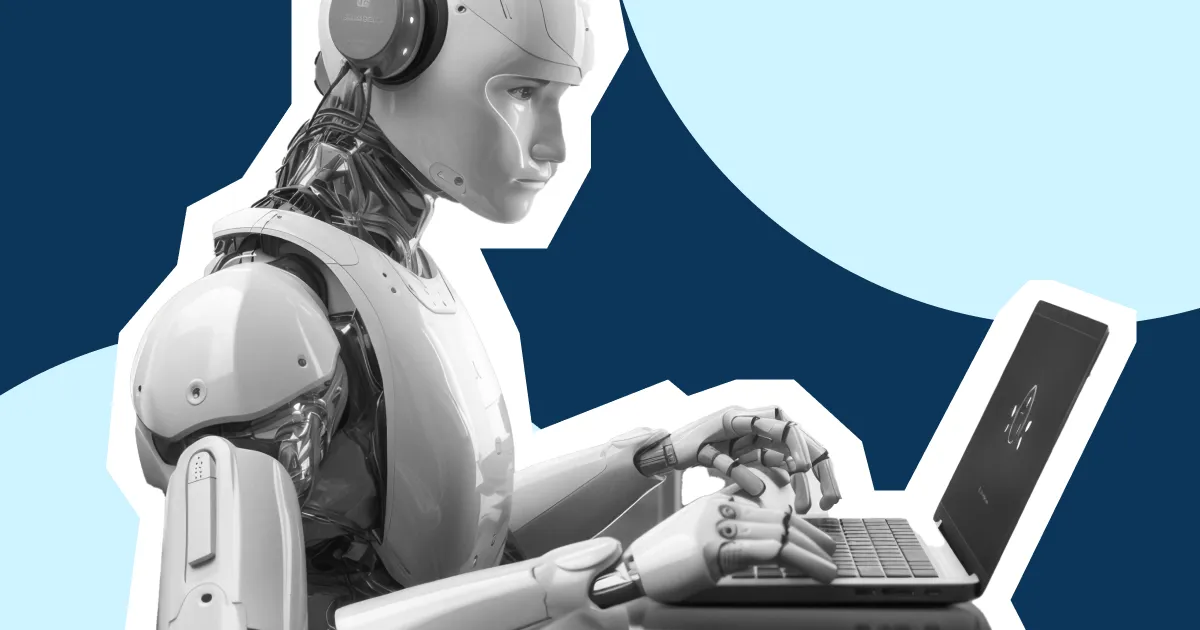Summary
Today, it’s rare to visit a business website without encountering chatbots for customer service, or e-commerce platforms without personalised recommendations section. The common thread behind these innovations is Artificial Intelligence (AI). AI has been transforming the business landscape for years, but its impact has grown even more significant with the rise of generative AI. Tools like ChatGPT or Midjourney are pushing AI into the spotlight, making it an indispensable technology for businesses of all sizes.
AI in Business: What's Happening?
AI started off as a tool for specific tasks like analysing data or automating customer support. It helped companies cut costs and get things done faster. But now, with generative AI on the rise, AI is being used for much more. These advanced AI models can understand and generate text that sounds just like a human, opening up new possibilities for things like digital marketing, content creation, customer interactions, and decision-making. These advanced AI models can also provide actionable insights that help businesses make informed decisions and optimize their strategies.

Well, let's see. According to the data published by Statista in November 2023, Singapore had the highest rate of enterprises exploring or actively deploying AI. China, India, and the UAE were also prominent, with over 80% of respondents indicating either exploration or deployment of AI. In contrast, Western countries, particularly mainland European nations like France, Germany, and Italy, had the highest rates of non-usage or no exploration of AI. The U.S. showed a similar level of disengagement with AI. This trend may reflect the specialised industries in these regions that rely heavily on unique human skills.

Key Stats on AI Adoption
- 40% of Companies Worldwide Use AI: Almost half of the world’s businesses are already using AI in some way. Whether it’s to improve customer service or streamline operations, AI is playing a big role in helping companies grow. Many companies are also leveraging AI for search engine optimization, using these tools to improve their online visibility and engagement.
- 82% Are Using or Exploring AI: A large majority of businesses are either already using AI or are looking into how they can start. This shows just how important AI is becoming in today’s competitive market.
- India Leads with 59% AI Adoption: India is ahead of the game when it comes to AI, with nearly 60% of companies using it. This reflects the country’s booming tech industry and its focus on staying ahead with the latest technology. It is closely followed by UAE at 58% and Singapore at 53%.
- Global AI Market Could Hit $1.85 Trillion by 2030: The AI market is expected to grow rapidly, reaching nearly $2 trillion by 2030. This growth is driven by the increasing demand for AI solutions across different industries.
- Big Companies Are Twice as Likely to Use AI: Larger companies are leading the way in AI adoption, being twice as likely to use AI compared to smaller businesses. They have more resources and data, which makes it easier for them to take full advantage of what AI has to offer.
To gain insights into how businesses are utilising AI tools, Forbes Advisor surveyed 600 business owners who are either already using or planning to incorporate AI in their operations. The data was collected from March 20 to April 5, 2023. Here are the key findings:
Here's a breakdown of how businesses are using AI across various functions:

However, in this article, let’s look at how AI has impacted marketing.
What is AI in Marketing?
Definition of AI in Marketing
AI marketing refers to the use of artificial intelligence (AI) technologies, such as machine learning and natural language processing, to enhance and automate marketing efforts. These advanced marketing tools can analyze large datasets, gain insights into customer behavior, and provide personalized recommendations to optimize marketing strategies. By leveraging AI, businesses can create more effective and targeted marketing campaigns, ultimately driving better results and improving overall efficiency.
Benefits of AI Marketing
The benefits of AI marketing are manifold, offering increased efficiency, improved customer experience, and enhanced decision-making. AI marketing tools can automate routine tasks, such as data analysis and content creation, freeing up marketing teams to focus on more strategic activities. This automation not only saves time but also reduces the risk of human error. Additionally, AI can provide valuable insights into customer behaviour and preferences, enabling businesses to tailor their strategies to meet specific needs. By leveraging these insights, companies can gain a competitive edge and deliver more personalized and engaging customer experiences.
The Current Existence of AI in Marketing
AI has transformed the marketing world from a distant dream into a powerful tool for your business. AI is driving personalised ads, predictive analytics, and enhanced customer experiences. AI can automate tasks, tailor content to individual preferences, organise leads, and analyse customer behaviour to make accurate predictions.
The rise of AI tools reflects its growing impact on marketing. Technology companies are rapidly developing advanced tools to boost productivity and efficiency for brands. AI is reshaping how people search for information, receive tailored recommendations, interact with brands through chatbots, and use voice search.
AI writing tools are also becoming essential for generating high-quality content, from blog posts to marketing copy, with minimal human intervention.
Foundation, a content marketing agency specialising in B2B SaaS companies, conducted a survey of over 360 marketers, including leaders, managers, specialists, and SEO experts.
The survey highlights the key benefits of AI in marketing:
- 68% of marketers find AI most useful for automating routine tasks
- 46% say it enhances customer experience
- 45% appreciate its role in improving targeting and segmentation
Most marketers (85% of those surveyed) are already using AI daily to boost their performance. Content creation tops the list of AI applications, used by 87% of marketers. Other popular uses include AI for keyword research (42%), AI in social media marketing (39%), email marketing (39%), and note-taking (36%).
How to Use AI in Marketing
Using the Right Tools for Business Efficiency
Different tools serve different purposes in your business because each one is designed to tackle specific tasks. Just as you wouldn’t use a hammer to cut wood, you need the right tools for various business needs. Whether it's improving productivity, enhancing marketing efforts, or streamlining operations, using the appropriate tools helps you achieve better results. By choosing the right tool for each task, you can save time and reduce errors. Many AI marketing tools also integrate seamlessly with other marketing tools (e.g. Google Studio) further enhancing your collaboration and productivity.
Leveraging Data Analysis and Machine Learning for Generative AI in Marketing
Here’s how AI marketing tools leverage data analytics and machine learning to enhance your marketing efforts:
Data Analytics
This involves collecting and analysing large datasets to uncover patterns, trends, and insights about customer behaviour and market dynamics.
- Customer Insights: AI analyses vast amounts of data to give you detailed insights into customer behaviours, preferences, and trends. These actionable insights enable you to make data-driven decisions, understand your audience better and tailor your strategies to meet their needs.
- Performance Metrics: AI tracks and analyses key performance indicators (KPIs) like conversion rates, engagement, and Return on investment (ROI). This data-driven approach allows you to optimise your campaigns for better results.
Market Research: AI collects and examines data from various sources to spot market trends, perform competitive analysis, and identify new opportunities.
Machine Learning
This technology enables systems to learn from data and improve over time without explicit programming, allowing for predictive analytics, personalisation, and automation.
- Personalisation: Machine learning algorithms use data to create personalised experiences for your users, including tailored content recommendations, customised email campaigns, and targeted ads.
- Predictive Analytics: AI predicts future trends and customer behaviours based on historical data, helping you anticipate customer needs and adjust your strategies accordingly.
- Automation: Machine learning automates repetitive tasks like content creation, social media posting, and email marketing, increasing your efficiency and consistency.
- Content Creation: AI tools assist in generating content, from blog posts and social media updates to marketing copy and video scripts, ensuring that your content is both relevant and engaging.
One of the most common examples of AI in sales and marketing is its application in digital marketing.
AI in Digital Marketing
AI in digital marketing relies heavily on both data analysis and machine learning.
- Data Analysis: AI uses data analysis to gather and interpret vast amounts of information about customer behaviour, preferences, and trends. This analysis helps in making informed decisions, optimising strategies, and personalising marketing efforts.
- Machine Learning: Machine learning, a subset of AI, enables systems to learn from data and improve over time without being explicitly programmed. It powers predictive analytics, ad targeting, customer segmentation, and personalisation by recognising patterns and making accurate predictions based on historical data.
Together, data analysis provides the raw insights, and machine learning refines and applies these insights to enhance marketing strategies effectively. As a business owner, leveraging AI in digital marketing can revolutionise how you connect with customers and grow your brand. AI helps you deliver personalised experiences, like tailored content and targeted ads, that resonate with your audience and boost engagement. It streamlines your processes by automating tasks such as customer support with chatbots and optimising your ad campaigns for better ROI. This is one of the classic AI in marketing examples. With the right AI tools for digital marketing, you can gain valuable insights from data, predict trends, and make smarter decisions that keep you ahead of the competition. Embracing AI means you're not just keeping up, you're leading the way in your industry.

Best AI Tools for Marketing
So, here are some of the top marketing AI tools used, along with their key functions:
*Please note that prices may vary over time, so it's best to visit the website for the most accurate and up-to-date information.
Now that you're familiar with the top paid and free AI tools for marketing, you can explore them and decide which ones best suit your business needs.
How to Effectively Use AI Marketing Tools
Here’s a guide to using AI marketing tools effectively:
- Start Small: Begin by selecting a few AI tools that best align with your marketing goals and business needs. Take the time to explore their features and understand how they can benefit your strategy.
- Experiment: Once you're familiar with the best AI marketing tools, test different approaches. For example, try varying your messaging and targeting to see which combinations yield the best results. This helps you understand the tool's capabilities and find what works for your audience.
- Train Your Team: Ensure your team is well-trained in using these AI tools. Provide them with the necessary resources and training sessions to maximise their effectiveness. A knowledgeable team can leverage these tools more efficiently and make better decisions.
- Automate Repetitive Tasks: Use AI tools to handle repetitive and manual tasks, such as data entry, email responses, or social media posting. This automation frees up your time for more strategic and creative tasks, allowing you to focus on high-impact activities.
- Monitor Performance: Regularly track and analyse the performance of the AI tools you’re using. Look at metrics like engagement rates, conversion rates, and ROI. Adjust your strategies based on the insights you gather to continuously improve your marketing efforts.

Future of AI in Marketing
What’s Next for AI Marketing Tools?
The future of AI marketing tools is both exciting and rapidly evolving. As AI technologies continue to advance, we can expect to see even more sophisticated and effective marketing tools emerge. Some potential trends and developments in AI marketing include:
- Increased Use of Machine Learning and Deep Learning Algorithms: These technologies will further enhance the ability to analyze customer data and provide personalized recommendations, making marketing efforts more precise and effective.
- Greater Emphasis on Natural Language Processing and Conversational AI: Improving customer experience and engagement through more intuitive and human-like interactions.
- Integration with Other Technologies: AI marketing tools will increasingly integrate with the Internet of Things (IoT) and virtual reality (VR), creating immersive and interactive marketing experiences that captivate audiences.
- Growing Importance of Data Quality and Governance: As businesses rely more on AI, ensuring that their AI systems are transparent, accountable, and fair will become crucial. High-quality data and robust governance frameworks will be essential to maintain trust and effectiveness.
As AI in marketing continues to evolve, businesses will need to stay ahead of the curve to remain competitive and achieve their marketing goals. Embracing these advancements will not only keep you in the game but position you as a leader in your industry.
Use 'Aspire AI' to Transform Financial Management
We, at Aspire, are thrilled to launch ‘Aspire AI,’ an advanced suite of AI-powered features designed to transform how you manage finances. Our commitment to enhancing financial processes through automation and real-time insights is stronger than ever.
With Aspire AI, you can embrace the future of finance automation. Save time, cut costs, and eliminate manual work.
Here’s what we offer:
- AI-Powered Dashboard: Get comprehensive cash flow analytics and spend insights. Make better financial decisions with ease, all from one dashboard.
- Instant Receipt Scanning: Upload and scan receipts instantly with OCR technology. Our AI extracts information automatically, so you never have to enter data manually. Process multiple bills and claims at once with ease.
- Enhanced Spend Visibility: Detect unusual spending in real time and ensure compliance with automated reminders, receipt matching, auto-categorisation, and smart spend limits.
24/7 Security: Our AI monitors for irregular activity or fraud, automatically freezing your card to give you peace of mind around the clock. - AI Assistant: Access instant answers with our AI assistant. Whether it’s incorporation or platform integrations, get the support you need anytime.
- Advanced Card Issuance: Issue virtual cards at scale using our Card Issuance APIs. Create unlimited virtual cards programmatically to pay suppliers instantly, streamline payments, enhance cash flow, and reduce fraud risks.
- Unlimited Cashback: Boost your savings with our corporate card for businesses. Earn up to 1% cashback on expenses like digital marketing, software subscriptions (SaaS), e-commerce, and business logistics.
- Automate Tasks: Automate your finance team’s tasks with our intuitive AI. Whether it's creating corporate cards, automating payables or managing budgets, just let us know what you need, and we’ll handle the rest.
So, all that's left for you to do is sign up and get started with your Aspire Business Account.










%201.webp)


.webp)